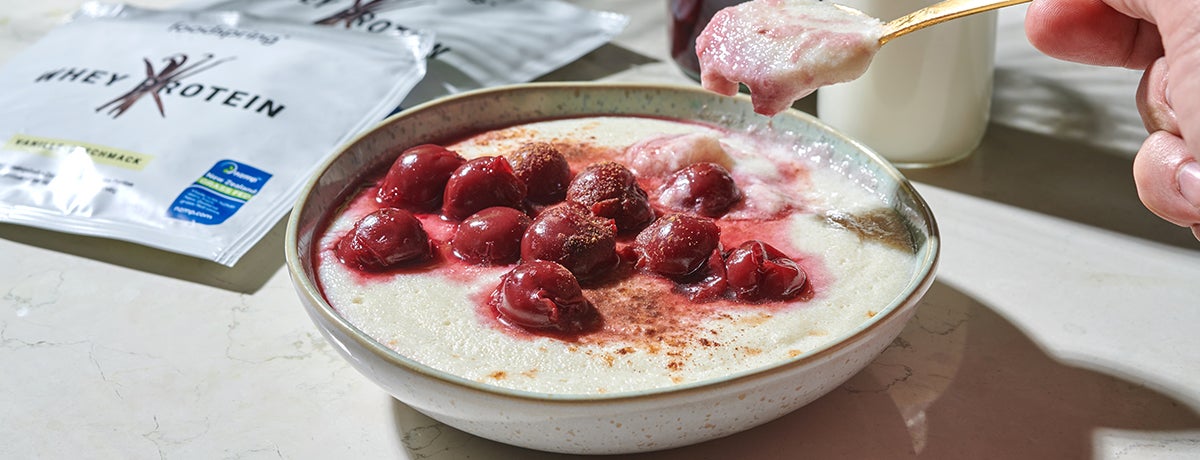Sleep, weight loss, and muscle gain: How are they connected?
 ©iStock/Geber86
©iStock/Geber86
Muscle building and slimming are only possible when you get enough sleep. Sounds logical enough, but it’s also way more important than you might have thought. Find out more about how sleep, weight loss, and muscle gain actually work!
When you train hard, you also have to recover hard. If you don’t give your body enough recovery time, your winning streak won’t last very long. You might injure yourself due to either overtraining or tiredness-related training errors. Or your body might just exhaust its energy reserves, which can only be replenished with good sleep hygiene.
How to Lose Weight in Your Sleep
The majority of your muscle regeneration happens while you’re sleeping. The better your sleep, the better your athletic performance. The time when you sleep is the only phase of the day in which your body can focus completely on regeneration.
And it’s not always true that the more you sleep, the better. All of these factors are important:
Sleep quantity: Are you getting as much sleep as you need?
Sleep duration: How many hours do you sleep at one time?
Sleep quality: How well do you sleep?
FYI: Sleeping 8 hours a day is a good guideline, but it’s not the be all and end all. Several apps for smartphones or smart watches can help you assess your sleep duration and sleep quality.
Keep a sleep routine instead of bingeing
The “strong and slim while you sleep” principle works best when you develop a regular sleep routine that your body can get used to. Every body has its own circadian rhythm, which often correlates with the cycle of light and darkness between day and night.
A healthy routine includes going to bed and getting up at a similar time throughout the week and getting the right amount of sleep as often as possible. Sleeping in on the weekend will throw you off balance and have a counterproductive effect. Less is more: if you can, stick to your sleep schedule on weekends as well.

This Is How Sleep Affects Muscle and Weight Gain
But how exactly does a good night’s sleep make your muscles grow? Adequate sleep influences muscle gain through several biochemical processes.
#1 Glucose metabolism increases
Getting a better night’s sleep helps your body metabolize and use carbohydrates better. Glucose metabolism replenishes the glycogen stores in your muscles so you have enough energy for your next workout. It also improves neuroplasticity, which is your brain’s ability to adapt to new stimuli and is important for improving your coordination and reaction times.
#2 Growth hormones are released
Getting enough sleep increases the concentration of testosterone and HGH (human growth hormone) in your blood. These repair the micro-injuries to your muscles caused by working out. New amino acids are then incorporated into the muscle mass to form new muscle fibers, which is how your muscles grow in strength and size.
#3 Inflammatory and stress hormones are reduced
Later in the day, as dusk fades into night and while you’re sleeping, the body’s primary stress hormone, cortisol, decreases. Cortisol has a catabolic effect: breaking down muscle while blocking fat loss.
Normally, cortisol levels decrease the same amount that melatonin levels increase. Melatonin is the body’s sleep hormone, and it gradually puts your body into a state of rest.
The higher your melatonin level, the less cortisol is present in your blood. That’s why you should try to significantly reduce cortisol levels even before bedtime by avoiding stress and blue light from smartphones, screens, and other light sources. Our other evening rituals will take your healthy evening routine to the next level.
#4 Your immune system can run at high speed
Sleep is when your body breaks down metabolic waste products and fights off potential pathogens. This has only an indirect effect on muscle building, but it’s still important: the fitter you are, the better you can train. Regeneration is also faster and more efficient in healthy bodies.
#5 Your energy levels increase
Simple but true: If you’re more rested, you’ll have more energy. Your exercise performance increases with your energy, and you can set more intensive training stimuli. Especially during muscle building phases, hypertrophy training is the key to success.

How Enough Sleep Leads to Fat Reduction
Sleep weight loss actually does work! And it doesn’t involve any weird diet plans, just the right amount of sleep in combination with a small calorie deficit and healthy diet.
#1 Poor sleep makes you hungry
If you’re sleep deprived, you can end up with an imbalance in the hormones that regulate your appetite. Increased cortisol levels combine with fatigue and lack of energy and the satiety hormone leptin decreases, with a simultaneous increase in the hunger hormone ghrelin.
Unfortunately, these imbalances rarely lead to a day of eating healthy meals. Instead, your cravings for high-carb snacks often increase and that can lead to weight gain.
Our tip: Go for high-protein snacks instead! Protein helps build and maintain muscle and causes insulin levels to rise less quickly and drastically than chocolate bars and other high-sugar foods.Satisfy cravings with high-protein snacks
#2 Sleep loss blocks fat metabolism
Poor sleep is double trouble for breaking down fat because of increased cortisol levels and a slower glucose metabolism. Excessive cortisol levels tell your cells to burn carbs while keeping them from breaking down body fat.
Some studies suggest that chronic sleep deprivation can also result in insulin resistance, causing cells to absorb less glucose from the blood. So it not only makes fat loss more difficult, but can even lead to diabetes in the long run.[1]
How Much Sleep Do I Need?
The American Academy of Sleep Medicine divides sleep into 3 phases: The light sleep phase, REM sleep, in which you dream a lot and recover mentally, and the deep sleep phase. These phases run in cycles: light sleep is followed by REM sleep, which leads to deep sleep, and then it starts all over again.
Many sleep researchers estimate that a sleep cycle consisting of these three phases lasts about 90 minutes.[2] Sleep researcher and sleep coach of international top athletes, Nick Littlehale, recommends planning your sleep so you can complete at least(!) four full cycles per night.
This equates to 6.5 hours of net sleep time.[3] The next cycle would be completed after 8 hours of sleep. Most experts adhere to the recommendation of about 8 hours of sleep as the basis for optimal muscle building and fat loss during sleep.
The most important hormones for building muscle are released during the deep sleep phase. Deep sleep accounts for about 5-15% of your total sleep time each night.[4]
Is it possible to have muscle gain despite sleep loss?
In the short term, yes: Just one night of poor sleep may put a damper on the next day, but it won’t affect your training progress directly. It’s more important that you get the right amount of sleep regularly throughout the week. But that doesn’t mean you have a free pass for all-nighters. The better you manage to stick to your bedtime, the more your muscles will grow.
In the long run, no: If you stay so sleep deprived that your hormone metabolism remains off balance, it will probably lead to the wrong kind of weight gain. The ratio of unhealthy belly fat in particular increases with ongoing sleep deprivation.
It’s a good idea to get back on your sleep cycle as soon as possible. Quality sleep – along with the right lifestyle and diet – is what makes you fit, strong, and healthy.
3 Recipe Ideas to Support Muscle Gain
For muscle building, the body needs about 1.2-1.4g of protein per kilo of body weight per day, and the lion’s share of your body’s supercompensation takes place while you sleep. Therefore, in addition to a fixed bedtime, it’s also good to plan additional high-protein food intake for about 2-3 hours before bed.
Define Your Muscles With These Tasty Recipes
But if your stomach is too full, you won’t sleep well because digesting high-protein meals means extra work for your gut. That’s why it’s a good idea to combine easily digestible protein with light and healthy side dishes. Soups and steamed vegetables, for example, are great recipes for a light evening meal.
No time to cook or not really hungry? Then a protein shake in the evening is the perfect solution. A protein with a high casein content is particularly good before bed: it absorbs slowly so it provides your muscles with protein for up to seven hours.
#1 Light Quiche Lorraine á la protein
Quiche is probably the last thing that comes to mind when you’re looking for a recipe to build muscle and reduce fat while you sleep. That’s why our version is different in a few key ways. Low in carbs and fat, it’s easy to digest but still hearty, luscious, delicious, and, of course, high in protein.

Click here for the classic made healthier
#2 Vegan Protein Pancakes with Asparagus
Pancakes satisfy pretty much any craving and our Vegan Protein Pancakes with asparagus make for the perfect savory dinner. Reduce the calories by blotting the pancakes with paper towels after frying. Our tip: Use other seasonal vegetables for your garnish!

Protein power pancakes? Yes, please!
#3 Sugar-free Semolina Pudding
Prefer sweet dishes at night? Then our semolina pudding is just right for you! Easy to digest, sugar-free, and with 21g of protein per serving. Choose your toppings according to what’s in season!

Conclusion
- Sleep is the foundation for muscle recovery.
- A lack of sleep makes muscle building and body fat reduction more difficult.
- Regular bedtimes and wake-up times support muscle building and losing weight. Even on weekends!
- Eat a high-protein snack about 2-3 hours before you go to sleep. Avoid eating a heavy meal.
- Try to sleep at least 6.5 or 8 hours per night. How much sleep you need depends on a few different factors, so it varies from person to person.
Sources for this article
We at foodspring use only high-quality sources, including peer-reviewed studies, to support the facts within our articles. Read our editorial policy to learn more about how we fact-check and keep our content accurate, reliable, and trustworthy.
- [1] Mesarwi O, Polak J, Jun J, Polotsky VY. Sleep disorders and the development of insulin resistance and obesity. Endocrinol Metab Clin North Am. 2013;42(3):617-634. doi:10.1016/j.ecl.2013.05.001
- [2] Graumann Dr., Lutz: Regeneration im Schlaf. Nur wer richtig regeneriert, wird langfristig leistungsfähig. In: Functional Training Magazin 01/2020. S. 64-69.
- [3] Littlehales, Nick: Sleep. 2016.
- [4] Graumann Dr., Lutz: Regeneration im Schlaf. Nur wer richtig regeneriert, wird langfristig leistungsfähig. In: Functional Training Magazin 01/2020. S. 64-69.

































